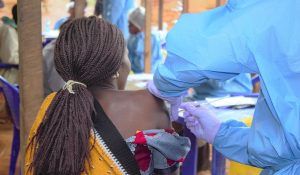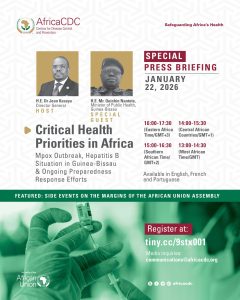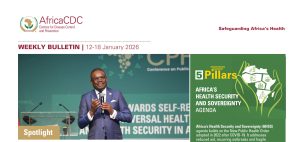The number of articles published in the Journal of Public Health in Africa (JPHIA) has seen a significant increase, rising from an annual average of 70 articles between 2018 and 2024 to 104 articles in just the first half of 2025. The peer-reviewed academic journal dedicated to advancing public health discourse across the African continent has demonstrated significant improvements, with submissions increasing by 30% compared to 2024. The median time to first editorial decision without peer review improved from 7 to 3 days and with peer review, from 72 to 48 days.
Owned by the Africa Centres for Disease Control and Prevention (Africa CDC) since 2018, JPHIA serves as a platform to elevate African research, perspectives, and practices within the global scientific and public health communities. Since 2018, the journal has published over 650 articles. Submissions now come from authors in 47 African Union Member States, substantially contributing to the publications output from the continent.
In recent months, the JPHIA has undertaken several strategic initiatives to strengthen its editorial operations and broaden its reach, said Dr Nebiyu Dereje, Head of Division, Knowledge Management at Africa CDC and Editor-in-Chief of the JPHIA. “The journal has significantly expanded its editorial team, bringing in diverse expertise from across the continent and beyond,” said Dr Dereje. It has also grown its pool of peer reviewers, enhancing the quality and efficiency of the review process. In parallel, JPHIA has increased its visibility through targeted social media engagement and digital outreach, resulting in greater awareness and engagement from the global public health community,” he noted
These efforts have directly contributed to measurable improvements in submission quality, review timelines, and overall journal performance. “To further build sustainable scientific publishing capacity, JPHIA launched a structured mentorship program for early-career researchers from African Union Member States. This initiative provides hands-on guidance in scientific writing and publishing and has already led to the submission of high-quality manuscripts from mentees—demonstrating early success and long-term potential for impact,” said Dr Dereje.
To further strengthen the quality of the journal, JPHIA is working on commissioning high-quality articles from prominent African scientists, improving website design and visibility, and enhancing journal promotion. JPHIA, through sponsorship from Africa CDC, provides a 55% waiver to article processing charges (APCs) for all submissions, and the publisher (AOSIS) also provides a needs-based full waiver for African researchers who have no funding for APCs from their institution. This makes JPHIA the most feasible journal for African researchers to publish their research outputs.
Dr. Mosoka Papa Fallah, Acting Director of Science and Innovation Directorate at Africa CDC and Chair of the Journal Oversight Committee, commended the progress made in strengthening the Journal of Public Health in Africa (JPHIA). He emphasized the importance of further promoting the journal to increase its visibility and attract high-quality submissions. Dr. Fallah also highlighted the need to reduce Article Processing Charges (APCs), advocating for a full waiver for African authors. He noted that high APCs remain a significant barrier for early-career researchers across the continent, and addressing this challenge is essential for fostering inclusive scientific publishing.
Dr. Fallah also emphasized the critical importance of enhancing the scientific publication capacity of African researchers. He advocated for the implementation of comprehensive and sustainable programs that include targeted training workshops, structured mentorship initiatives, and the development of robust professional networks. Additionally, he highlighted the need for greater access to open-access publication platforms and a significant increase in funding dedicated to research across the continent. Dr. Fallah noted that both the directorate and the JPHIA are well-positioned to play pivotal roles in driving these efforts forward, fostering a more inclusive and competitive research environment in Africa.
To further expand access to equitable publishing platforms and amplify African-led scholarship, the JPHIA envisions the establishment of a Pan-African Network of Health Journals. This initiative aims to foster collaboration among African journals, strengthen editorial and peer review capacities, and enhance the visibility and impact of regionally relevant research. By creating a unified platform, the network will serve as a powerful vehicle for disseminating public health evidence that addresses Africa’s unique challenges and priorities—ranging from infectious diseases and non-communicable conditions to climate-related health threats.
The network will also promote shared standards in scientific publishing, facilitate joint special issues on cross-cutting health topics, and advocate for open access and sustainable publishing models tailored to the African context.
In addition, JPHIA has established a community of practice with leading global journals—including Eurosurveillance (ECDC), Emerging Infectious Diseases (US CDC), and the Bulletin of the World Health Organization. Through these partnerships, JPHIA engages in regular knowledge exchange, peer learning, and collaborative editorial development. These relationships not only strengthen the journal’s editorial quality but also position African public health voices within global scientific discourse.
“The Journal of Public Health in Africa is firmly positioned on a path of growth, innovation, and continental impact. Through strategic editorial reforms, expanded mentorship, increased visibility, and collaborative partnerships, JPHIA is improving its performance metrics, redefining what African-led scientific publishing can look like,” said Dr Dereje.
“Its vision to establish a Pan-African network of health journals and its commitment to capacity building reflect a broader ambition: to ensure that African public health research is not only produced but also heard, shared, and acted upon. As JPHIA continues to evolve, it remains a vital platform for advancing evidence-based public health solutions that are rooted in African realities and responsive to global challenges,” he added.







